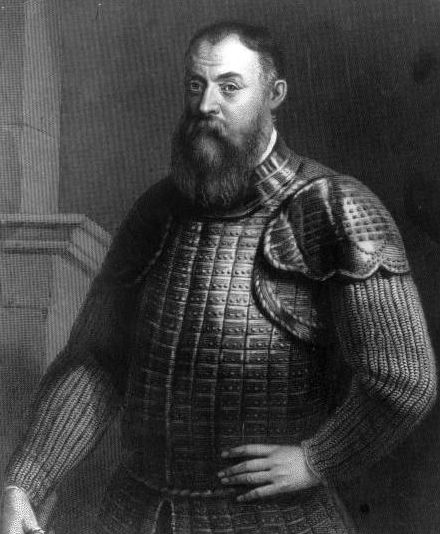Today in History - July 20
• Hugh O'Neill resists the British in Ireland
• Mungo Park sees the River Niger
• Gugliemo Marconi invents wireless
-- Compiled by James Finlayson-Bald
 Hugh O'Neill (Irish: Aodh Mór Ó Néill; literally Hugh The Great O'Neill; c. 1550 – 1616), was an Irish Gaelic chieftain and the Earl of Tyrone who was a major Irish leader during the Tudor conquest of Ireland. He led the Irish resistance to the British during the Nine Years' War.
On this date:
1616--Hugh O'Neill, second Earl of Tyrone, died in Rome. He succeeded to the title when his brother Brian was murdered by Turlough, Earl of Clanconnell. He served with the English against Desmond in Munster and with Sir John Perrot against the Scots of Ulster. He gradually became involved in plots and feuds all over Ireland. He allied himself to the nephew of a former enemy Calvagh O'Donnell, and opened communications with Philip II of Spain, putting themselves forward as champions of the Catholic religion and claiming liberty of conscience and political affiliation for the inhabitants of Ireland. This letter was intercepted by the viceroy, Sir William Russell. In 1598 he was granted a Royal Pardon by Elizabeth but within two months he was back in the field and defeated an English force at the Yellow Ford on the Blackwater. Had he known how to profit from this victory he might have successfully with-stood English power in Ireland. He continued disputations and retired to Rome in 1607.
Hugh O'Neill (Irish: Aodh Mór Ó Néill; literally Hugh The Great O'Neill; c. 1550 – 1616), was an Irish Gaelic chieftain and the Earl of Tyrone who was a major Irish leader during the Tudor conquest of Ireland. He led the Irish resistance to the British during the Nine Years' War.
On this date:
1616--Hugh O'Neill, second Earl of Tyrone, died in Rome. He succeeded to the title when his brother Brian was murdered by Turlough, Earl of Clanconnell. He served with the English against Desmond in Munster and with Sir John Perrot against the Scots of Ulster. He gradually became involved in plots and feuds all over Ireland. He allied himself to the nephew of a former enemy Calvagh O'Donnell, and opened communications with Philip II of Spain, putting themselves forward as champions of the Catholic religion and claiming liberty of conscience and political affiliation for the inhabitants of Ireland. This letter was intercepted by the viceroy, Sir William Russell. In 1598 he was granted a Royal Pardon by Elizabeth but within two months he was back in the field and defeated an English force at the Yellow Ford on the Blackwater. Had he known how to profit from this victory he might have successfully with-stood English power in Ireland. He continued disputations and retired to Rome in 1607.
1796--Mungo Park, Scottish explorer, arrived at Segou and became the first white man to see the River Niger. He followed it downstream until forced to return by obstructions so failed to trace its exit.
1799--The Young Fur Traders, de la Maissonneuve and Preneloupe arrived at the site of what is now Denver, Colorado.
1845—A brisk fire in New York City destroyed 300 business premises.
1857—The Comanche Indians were defeated by the Cavalry at Devil's River, Texas.
1878—Final battle of the Bannock Indian War in Oregon.
1881—The Sioux Indian chief, Sitting Bull, surrendered to U.S. Forces.
1917—Alexander Kerensky was named Premier of Russia by the Provisional Government. His decision to pursue the war against Germany undermined his popularity and in November he was overthrown by the Bolsheviks. He spent the remainder of his life in exile in Paris and the U.S.A.
1937—Guglielmo Marconi who cleverly developed the wireless set so that we could listen to the Jazz music, died, forty years to the day from the formation of his Wireless Telegraph Company.
1944—Count Clause von Stauffenberg's assassination attempt, by bomb, on Adolf Hitler failed..
1951—An Arab fanatic's assassination attempt, by dagger, on Abdullah ibn Hussein, King of Jordan, didn't.
Birthdays:
Miss Theda Bara, movie star (1890-1955)
Sir Edmund Hillary (1919-2008)
Quote:
Four hostile newspapers are more to be feared than a thousand bayonets. -- Napoleon.
The above article was written by James Finlayson-Bald.
Edited and illustrations added by David Paul Wagner.
|
